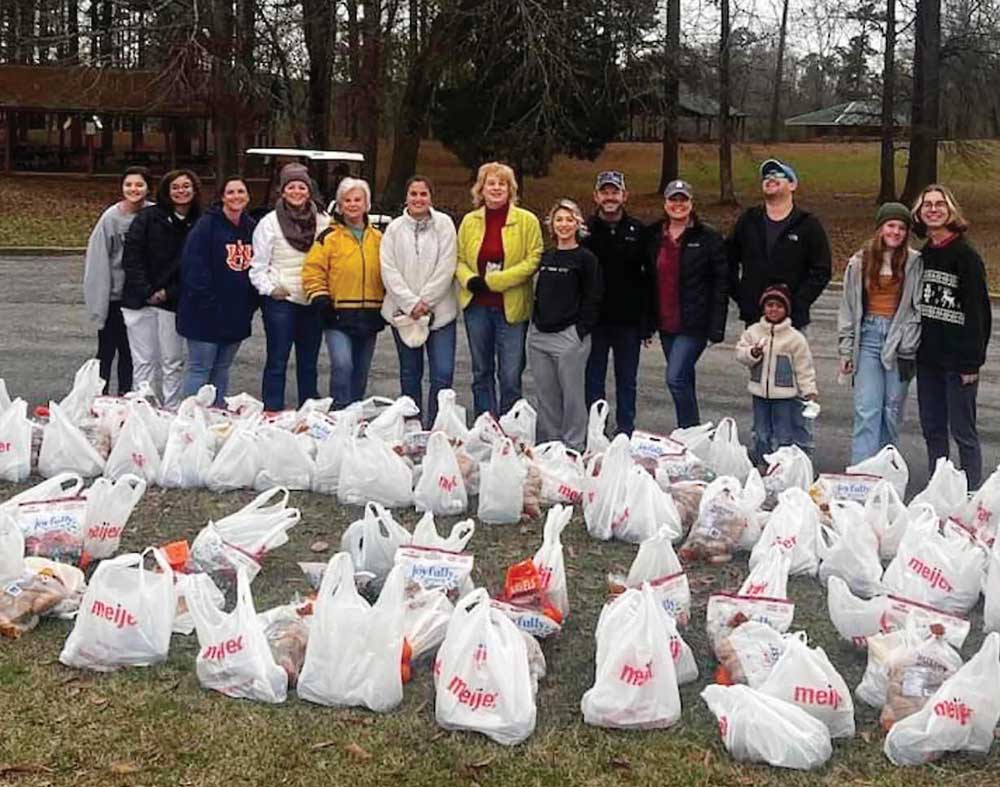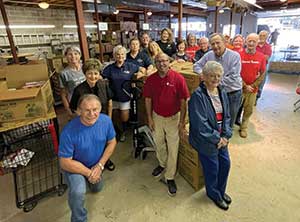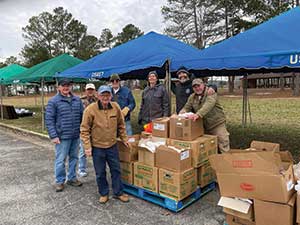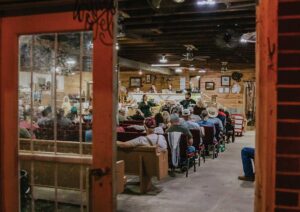
Taking care of neighbors in time of need
Story by Scottie Vickery
Submitted photos
Sue Turton will never forget the young girl who came to the Christian Love Pantry with her father years ago. She couldn’t have been more than 6 or 7, but she’d already experienced the hard realities of life. Her father had lost his job, the family was hungry, and they turned to the ministry based in Pell City for help.
The little girl’s eyes got wide as she looked at the groceries the volunteers had prepared for the family, Turton remembered. “Oh Daddy, look, there’s peanut butter,” the child said. “We’re not poor anymore.”
For more than four decades, the Christian Love Pantry, has been providing much more than just food to St. Clair County families in crisis. Based on the belief of neighbors helping neighbors, they’ve offered hope, love, kindness and compassion by the grocery cartful.
“The Lord always provides enough,” said Bob Osborn, a volunteer who serves as director of the nonprofit. “This community is wonderful that way. If we need something, they step up.”
That was certainly obvious in December when the Christian Love Pantry gave away 22,500 pounds of food during its annual Christmas in the Park event held at Lakeside Park. Area churches and civic organizations provided volunteers, and the St. Clair County Airport Authority and members of the Pell City Seventh Day Adventist Church distributed toys and treats collected during a toy drive sponsored by the Airport Authority.
“You’re helping people, and that’s what people need,” one recipient said. “There’s a lot of people who are hungry.”
In the beginning …
The Christian Love Pantry began in 1980 when three Pell City churches – St. Simon Peter Episcopal Church, First United Methodist Church and Our Lady of the Lake Catholic Church – joined forces to meet the ongoing need for emergency food distribution.
After receiving a donation of $10,000 in 1982, the Pell City Ministerial Council officially established the ministry, which was incorporated as a nonprofit in 1991 and began receiving United Way of Central Alabama funding. Since then, many more churches have come on board, helping in a variety of ways.
“The original articles of incorporation said the purpose was to help the needy in the community and to also give members of different denominations to work together for the common good and understanding of each other,” said Turton, who serves as secretary.
So far, they’ve remained true to both goals. Seven churches – the original three, plus Cropwell Baptist, Harvest Center, Pell City Seventh Day Adventists and First Baptist – still have members on the Christian Love Pantry’s board of directors. Another nine or 10 congregations provide volunteers, financial support, or food donations. “We are all different denominations, but we are all Christians and believe in Jesus,” Osborn said. “The unity we get from hanging out with one another and volunteering together is special.”
Providing daily bread
The organization, which serves thousands of people each year and is completely staffed by volunteers, is not a substitute for the Supplemental Nutrition Assistance Program (SNAP), often referred to as food stamps. Instead, it is designed to help families during emergency situations. For some, that’s the loss of a job or a health diagnosis resulting in high medical bills. For others, it’s a broken car transmission, a heating unit in need of repairs, or grandparents who have taken in a grandchild and haven’t started receiving benefits.
“We give them enough food to get through a crisis,” Turton said. Typically, the Christian Love Pantry offers two emergency services per family each year in addition to providing food during special giveaway events usually held in the spring or summer, at Thanksgiving, and before Christmas. Clients are referred by other agencies, churches, the 211 directory, or family, friends and neighbors.
All recipients must live in St. Clair County, meet federal poverty guidelines, or be facing a special circumstance. The average family served has 2.5 members and an income of about $1,200 a month, which is well below the federal guidelines, Turton said.
Twice a year, families can receive enough food to last a week, if not more. The bounty, based on the number of people in the household and the food available in the warehouse includes a variety of soups, stews, vegetables, peanut butter and jelly, beans, pasta, rice, crackers, powdered milk, flour, corn meal, and more. In addition, recipients get fresh produce such as apples, oranges, carrots and potatoes, as well as meat and chicken. Publix donates bread and pastries daily, and the pantry also provides items such as diapers and pet food when available.
“Some families come every six months, and some you may see every five years,” Osborn said. “We don’t send anyone who’s out of food and hungry away,” Turton said, adding that partial services can be provided when necessary.
In addition to the twice-yearly services, the Christian Love Pantry also hosts several special event distributions each year. In December, for example, 250 families received over 90 pounds of food, including a 6-pound ham, 8 pounds of chicken, ground beef, as well as a variety of canned goods, breads and staples.
So how does it all happen? It takes a lot of partnerships, Osborn said. United Way is still the ministry’s top funder, providing about 40 percent of the budget. The rest comes from grants, churches, individual donations, fundraisers and civic organizations.
The Community Food Bank of Central Alabama in Birmingham is an important partner, as well. The agency serves as a hub for food pantries, homeless shelters and children’s programs, and Christian Love Pantry volunteers can buy food, including meat, for 16 cents a pound through the Food Bank so they can distribute it to their clients. “We get a lot of good food for very little money,” Osborn said. “It allows us to give generously.”
In addition to bread and pastries, Publix donates pallets of food a few times a year. Fresh Value offers a discount on food, and fresh produce is harvested from Gateway Community Garden. In addition, local farmers donate fresh eggs. The volunteers also provide recipes and information about other social services available.
Meeting the need
At its peak, the Christian Love Pantry provided nearly 3,000 families with regular services in a year. In 2020, the numbers dropped since clients received relief payments from the government, but since then the numbers have been on the rise again. In 2021, the ministry served 1,150 households with 2,961 people, Turton said. Last year, 1,406 families with 3,607 people were served. About 30 percent of those were children.
Although volunteers currently number about 100, there’s always room for more, according to Debbie Parmenter, who is a former volunteer coordinator and current Board chair. Volunteer opportunities range from working directly with clients for screening and food distribution, stocking donations, using pallet jacks to move large quantities of food and picking up daily donations at Publix. Only one shift per month is required, but many volunteers look forward to helping more often.
“We all have our niche,” Osborn said. “This is one little thing we can do once or twice a month that contributes to the community at large.”
Many of the volunteers are retired and have supported the ministry financially for years, but they are now enjoying a more personal commitment now that their children are grown, and job commitments have ended. “Many of us for many years had more money than time to help,” Turton said. “It’s indescribably better to be on this side of it and provide more than financial support.”
For information about receiving assistance, call (205) 338-2358 during the ministry’s business hours, which are Monday, Wednesday and Friday from 9 a.m. to noon. To learn about volunteer opportunities, message them on The Christian Love Pantry Facebook page.

















